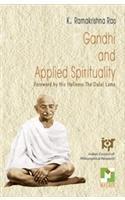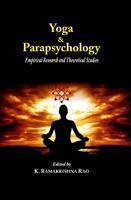 28.0%OFF
28.0%OFF

Download App
 28.0%OFF
28.0%OFF
Gandhi and Applied Spirituality
-
ISBN
:
9789381320006
-
Publisher
:
Matrix Publishers
-
Subject
:
Others
-
Binding
:
HARDCOVER
-
Pages
:
392
-
Year
:
2011
₹
895.0
 28.0% OFF
28.0% OFF
₹
644.0
Buy Now
Shipping charges are applicable for books below Rs. 101.0
View DetailsEstimated Shipping Time : 5-7 Business Days
View Details-
Description
Gandhi and Applied Spirituality is more than just another book on Gandhi. It deals with the spiritual foundations of Gandhian philosophy and practices and their relevance to today s world troubled by terror and violence. It discusses the scientific base for the so-called spiritual and dispels the false but widely prevalent notion that science and spirituality are mutually opposing endeavours. Sarvodaya, altruism, is the sine qua non of spirituality. Dr. Rao argues that science and spirituality are two parallel streams in pursuit of knowledge and that the secular and sacred are two distinct but complementary dimensions of human condition. Gandhi s thought and action show that there is more to humans than reasonand emotion and that we are spiritual beings as well. A recognition of this calls for a reconstruction in philosophy that would leave room for trans-rational forms of knowing and nonphysical causation in human relations. The chapter on identity, conflict and violence provides the context and shows the relevance of Gandhi to the current scenario of terror and violence. Then follows a discussion of Gandhian philosophy of spiritual pragmatism and satyagraha, the instrument of social action for conflict resolution. Dr. Rao depicts Gandhi as a yogin and satyagraha as yoga applied to social action. It is suggested that Gandhiji s pragmatic spiritualism could be a soothing syrup to congested minds coughing conflict and abuse. Offered by the right persons, for a right cause, at the right time, and in the right way, satyagraha is superior to any violent method of conflict resolution because, unlike the other methods, it has no adverse side effects. The primary thesis of the book is that satyagraha and its success as an instrument of social action cannot be properly understood without reference to its spiritual component. Gandhi was amazingly successful in showing the secular applications of spirituality and the consummate complementarities of science and spirituality, reason and intuition. There is enough empirical evidence in support of Gandhian thesis,which is itself something embedded in the Indian ethos. Recent investigations into Yoga and psychic phenomena and the epidemiological researchers of spirituality provide a scientific base for the Mahatma s spiritual convictions. Gandhi was both a statesman who lived a spiritual life and a scientist who conducted experiments in applied spirituality. Sketching the person as a composite of body, mind and consciousness, the book provides a psychological model for understanding Gandhi s life and practices.
-
Author Biography
Professor Koneru Ramakrishna Rao, is currently the Chairman of the Indian Council of Philosophical Research, New Delhi. He earlier served as Professor of Psychology and Vice-Chancellor at Andhra University, Visakhapatnam, India and Director of the Institute of Parapsychology and the Executive Director of the Foundation for Research on the Nature of Man in USA. He studied at Andhra University and the University of Chicago and received Ph.D. and D.Lit. degrees in philosophy and psychology respectively. Among the 15 books he published earlier are Experimental Parapsychology: A Review and Interpretation (Charles C Thomas, 1966); Gandhi and Pragmatism (Oxford & IBH, 1969); Consciousness Studies: Cross-Cultural Perspectives (McFarland, 2002) and Cognitive Anomalies, Consciousness and Yoga (Matrix Publishers, 2011). A member of numerous professional organizations in India and abroad, Prof. Ramakrishna Rao was elected thrice as President of the Parapsychological Association, an international society of scientists based in USA and twice as President of the Indian Academy of Applied Psychology. He is currently the President of Asian Congress of Philosophy. Dr. Rao travels widely and lectures at a large number of universities in India, Japan, and other Asian countries, USA, Canada and Europe. He worked at Duke University as a Research Associate and also taught at University of North Carolina at Chapel Hill, University of Tennessee at Chattanooga and California Institute of Human Science. Professor Rao served as the Editor of the Journal of Parapsychology (USA) for nearly twenty years. He is the founding editor of the Journal of Indian Psychology. He continues to serve on the editorial boards of a number of philosophy and psychology journals in the country and abroad. Professor Ramakrishna Rao has received several honours for his scholarly contributions, the most recent being the Padma Shri Award from the President of India. He was also honoured by the award of the degrees of Doctor of Letters (Honoris Causa) from Andhra University (his alma mater) and Kakatiya University and Doctor of Science (Honoris Causa) from Nagarjuna University.
Related Items
-
of












 644.0
644.0






 592.0
592.0





